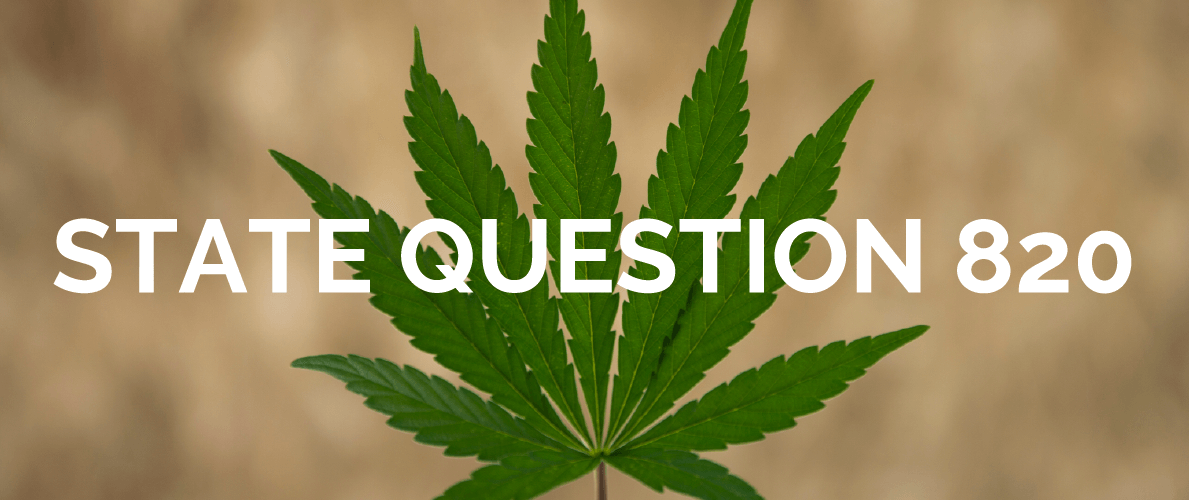
Oklahoma voters will cast their ballot on March 7 to decide whether legalization, regulation and taxing recreational marijuana is legal and beneficial to them. Under this measure, adults 21 or over could possess up to an ounce or eight grams of concentrated cannabis at any one time.
Proponents of the measure claim it will generate millions in taxes that can be put towards programs and services across Oklahoma. They also believe access to regulated marijuana will decrease break-ins and robberies at dispensaries.
What is SQ 820?
After Oklahoma voters rejected full marijuana legalization through State Question 820, attention now shifts to the Legislature as criminal justice changes related to low-level marijuana crimes and their ongoing aftermath from nearly five years of medical marijuana sales. Opponents have taken up classic arguments from the War on Drugs; religious leaders warning of increased drug use and organized crime while law enforcement officials say their focus will remain on combatting illicit grow operations as well as any issues caused by Oklahoma’s medical marijuana program lacking regulation.

Supporters of this measure argue that legalizing marijuana will safely regulate it for adults 21 and older, generate millions in new tax revenues for schools and other government services, and make law enforcement’s job of combatting illegal growing operations simpler. Under this initiative, recreational marijuana would incur a 15% excise tax with excess funds going directly back into local governments’ budgets for police/fire department costs, public school student services/drug addiction treatment programs as well as general revenue fund.
Who is SQ 820 for?
State Question 820 would have implemented safe regulation and common sense criminal justice reforms such as expungement for adults aged 21 and up, providing funding for schools, health care, public safety, and schools by imposing a 15 percent excise tax on retail sales to fund schools, health care, public safety as well as pay for the Oklahoma Medical Marijuana Authority costs, city/county governments costs related to combatting drug addiction as well as the state general revenue fund.
Supporters of recreational cannabis argue it can help reduce break-ins and robberies at marijuana dispensaries by creating a more regulated market that doesn’t lure criminals looking for quick riches. Furthermore, supporters believe it will generate jobs while freeing law enforcement up to focus on more serious drug crimes.
State election officials have challenged this measure because it does not meet state rules concerning verification of signatures on petitions to get on the ballot, however supporters remain hopeful it will make the cut for November’s ballot.
What is SQ 820’s Impact on Oklahoma’s Criminal Justice System?
Supporters of SQ 820 contend it would safely regulate marijuana for adults 21 and over, generate millions in tax revenue for local governments and schools as well as drug addiction treatment programs, free up law enforcement resources to target higher-level crimes, create a “responsible” system of production and distribution where products would be lab-test, labeled, track from seed to sale; private landowners would have the right to forbid recreational use on their properties while employers could enforce drug-free workplace policies.

Taylor Thompson, a public defender in Oklahoma County, supports State Question 820 because she sees clients who have been denied housing or work due to past marijuana convictions. According to Thompson, SQ 820 would allow individuals with low level marijuana convictions to expunge them through state question. But critics contend that SQ 820 violates the single subject rule in the constitution which stipulates initiative petitions can address only one topic at any given time.
What is SQ 820’s Impact on Oklahoma’s Economy?
Campaign supporters for Oklahoma ballot measure SQ 820 claim it could bring millions in tax revenue if it passes, according to Vicente Sederberg LLP’s economic analysis of it. Vicente Sederberg projected Oklahoma would see $821 million from combined medical and recreational marijuana sales over four years; 15 percent excise tax would first go toward administrative costs before going toward cities and counties (10%), state judicial revolving funds (20%), public school student programs (30%) and drug abuse treatment grants (40%).
Opponents argue that legalizing marijuana could present serious problems for children. Cleveland County District Attorney Steve Kunzweiler expresses concerns about increase emergency room visits due to children getting their hands on pot, as well as increase emergency department visits due to high THC content cannabis being grown now, which he suggests can cause suicidal thoughts and psychosis. Public defender Taylor Thompson from Tulsa also asserted that those with prior marijuana convictions still face arrest, as well as having difficulty finding housing or employment opportunities.
